As offshore wind developers worked their way up to a record-setting New England lease sale last week, New Jersey energy planners met once more in Atlantic City before setting their own goalposts.
“We’re looking for proposals that deliver not only the best price, but the best value,” said Anne Marie McShea of the Board of Public Utilities, the state energy regulators who will soon make a deal to buy up to 1,100 megawatts of power to be generated from future wind turbines.
For wind power advocates, that means a deal that will bring new jobs to New Jersey, both in building and operating offshore turbine arrays, and manufacturing components locally.
Almost a decade ago, it looked like the Garden State might take a lead role in developing offshore wind power. In Atlantic City, the Atlantic County Utilities Authority built the state’s first commercial-scale wind power project, adding the sight of five spinning rotors to the resort’s gaudy skyline.
In April 2009, then-Interior Secretary Ken Salazar came to town, talking up the new Obama administration plan to develop East Coast leases for wind power along with oil and gas, part of the “all of the above” energy strategy.
There was the Fishermen's Energy plan for a five-turbine offshore array, within sight of the Atlantic City beaches, conceived by the late Daniel Cohen of Atlantic Cape Fisheries, Cape May,N.J., as a way for seafood companies to get a place at the table for planning renewable energy.
But then-Gov. Chris Christie’s administration began to cool on the idea.
The Board of Public Utilities did not like aspects of the pilot project, including the projected cost to ratepayers. Then there were Christie’s presidential ambitions, which meant playing to the conservative Republican base with its dislike of renewable energy subsidies.
Meanwhile Deepwater Wind was building political alliances in Rhode Island, enabling the company to be first out of the gate with its 30-MW Block Island Wind Farm in 2016 — the first commercial U.S. offshore wind project.
With the arrival of Democratic Gov. Phil Murphy, New Jersey state policy turned 180 degrees within weeks of his inauguration. Murphy upped the ante in what is shaping up as competition among East Coast states to position themselves as the Louisiana of East Coast wind power, hoping to attract wind developers and the onshore industries and jobs that could follow.
The Murphy administration hopes its 1,100-MW plan will just be the first installment toward building 3,500 MW of offshore capacity by 2030. But it can’t be done at the expense of existing jobs, the commercial fishing industry warns.
“The impact to New Jersey will be devastating if the commercial fishing industry is displaced at all,” said Brick Wenzel, a captain who fishes out of Point Pleasant Beach, N.J.
On land, New Jersey is the most densely populated state in the Union, but its ports rank high in East Coast seafood landings, second only to New Bedford, Mass.
“You should do everything to avoid losing any jobs in New Jersey,” said Scot Mackey of the Garden State Seafood Association.
The Atlantic City offshore project -- renamed Nautilus after EDF Renewables came in as a partner with Fishermen's Energy -- still failed to "demonstrate the economic and environmental benefits required under the Offshore Wind Economic Development Act (OWEDA) for the state to commit ratepayer funds," board officials said in a statement.
“Unfortunately, the Nautilus demonstration project did not meet the net economic benefits standard as required by OWEDA, and the Board voted down the application,” said Joseph L. Fiordaliso, president of the New Jersey utilities board. “We look forward to reviewing the applications for 1,100 MW of offshore wind and anticipate greater net benefits with larger-scale projects. The award will cement New Jersey’s place as the national epicenter of the offshore wind industry.”
Despite the rejection, Nautilus backers deserve credit for their nearly decade-long effort to pioneer offshore wind power, said Liz Burdock, president and CEO of the nonprofit Business Network for Offshore Wind.
“Our position is that all responsible offshore wind energy projects at this point will play an important role in the growing US offshore wind market,” Burdock said after the BPU vote. “Although Nautilus was a small project, it has always offered significant value beyond the clean power in the form of optimizing the efficiency of the New Jersey offshore wind supply chain and business community.”




